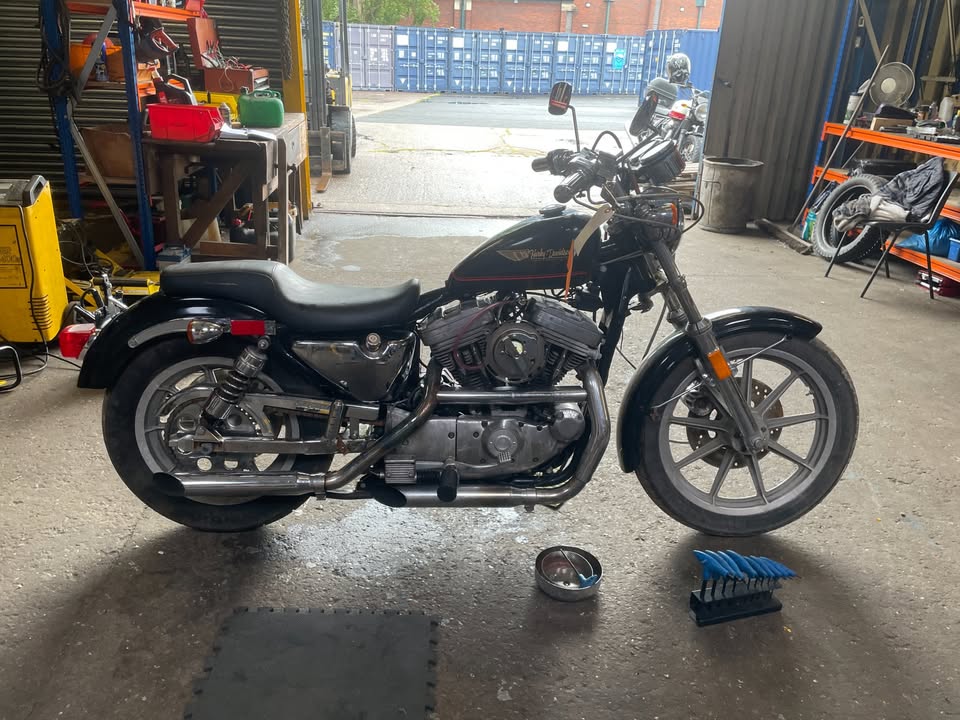Classic and Classy Motorcycles Ltd
Vintage and Classic Motorcycle Importers
1986 Harley Davidson Sportster XL883 883cc Project Ref 1534

The 1986 Harley-Davidson Sportster XL883: The Start of the Evolution Era
Historical Context
The year 1986 marked a major turning point in the history of Harley-Davidson’s Sportster lineup. After decades of using the Ironhead engine, Harley-Davidson introduced the new Evolution (Evo) engine in its Sportster range. The 1986 XL883 was the first of its kind to feature this updated, more reliable powerplant. The XL883, with its cleaner design, improved performance, and increased longevity, helped cement the Sportster's reputation as Harley’s accessible, entry-level model, while still preserving the brand’s trademark styling and feel. It played a crucial role in Harley’s resurgence in the late 1980s following the company's buyback from AMF in 1981.
Technical Specifications and Performance
• Year: 1986
• Make: Harley-Davidson
• Model: Sportster XL883
• Engine Displacement: 883cc
• Engine Type: 45-degree air-cooled V-twin Evolution
• Compression Ratio: 8.8:1
• Horsepower: Approximately 46 hp
• Carburetion: Constant velocity Keihin carburetor
• Ignition System: Electronic
• Transmission Type: 4-speed manual
• Cooling System: Air-cooled
• Braking System: Single disc front and rear
• Fuel Capacity: 2.2 gallons (peanut tank)
• Dry Weight: Approx. 485 lbs
• Top Speed: Around 100 mph
Technical Advancements
The major advancement on the 1986 XL883 was its new Evolution engine. Lighter and more refined than the previous Ironhead, the Evo offered improved cooling, tighter tolerances, and greater reliability. The aluminum heads and cylinders reduced engine heat, while the electronic ignition and solid-state components provided more consistent starting and better throttle response. It was also the first Sportster with the oil filter relocated for easier access and serviceability. These improvements significantly reduced maintenance, making the bike more user-friendly and mechanically robust.
Evolution of the Model
The XL883 was introduced as the smaller-capacity sibling to the XL1100 (soon after, the XL1200). While they shared the same chassis and styling, the 883cc engine gave newer riders and budget-conscious customers an accessible entry into the Harley-Davidson world. The 1986 redesign also brought a more modern look while retaining the essence of the classic Sportster silhouette. Future models would gain a 5-speed transmission and rubber-mounted engines, but 1986 remains significant as the beginning of the Evo Sportster generation.
Competitors in the Market
The XL883 entered a market populated by emerging Japanese middleweights such as the Honda Shadow 700 and Yamaha Virago 750. While those bikes boasted smoother performance and more features, the Harley retained a raw and distinctive character. It appealed to riders looking for American-built tradition, simplicity, and a direct mechanical connection to the road. Unlike its competitors, the XL883 offered endless customization potential and an iconic brand presence that others couldn’t match.
Legacy and Collectibility
The 1986 XL883 has since become a foundational model in Harley’s modern history. It represents the rebirth of the Sportster with the Evo engine—a unit that would power the lineup for over three decades. For collectors and enthusiasts, the first-year Evo 883 is a desirable piece, particularly in stock condition. It blends classic Harley aesthetics with a leap in engineering, making it a notable model for both historical significance and day-to-day usability.
Find Classic Motorcycles
Stay in the loop - Subscribe for Updates
One email notification a month when a new shipment arrives.